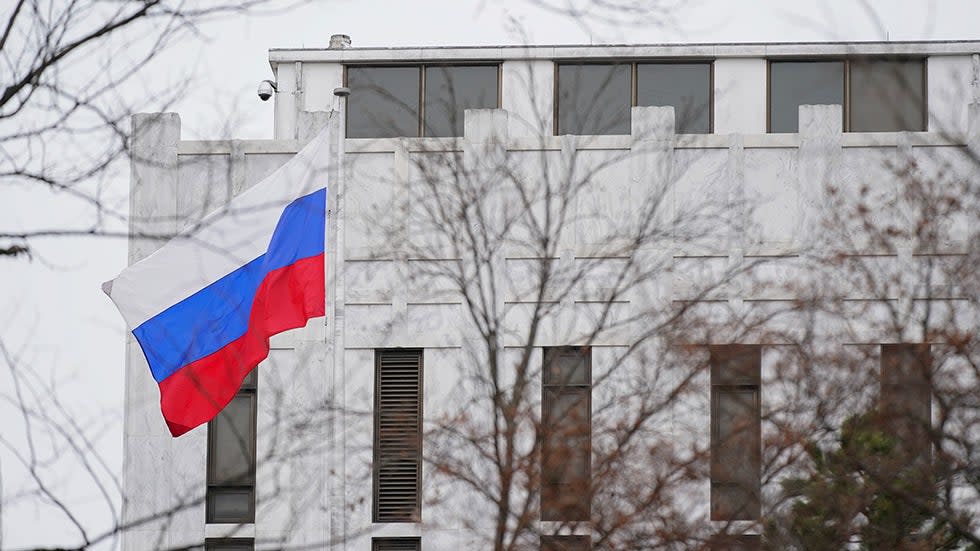Putin's Nazi claims jeered in West, but stoke Russian pride

- Oops!Something went wrong.Please try again later.
- Oops!Something went wrong.Please try again later.
To justify his invasion of Ukraine, Russian President Vladimir Putin has leveled an absurd charge: that forces must intervene to stop the Nazification of Ukraine at the hands of its Jewish leader, Volodymyr Zelensky.
"We will strive for the demilitarization and denazification of Ukraine," the Russian leader said in an address last week ordering a military attack on Ukraine, adding his goal was "to protect people who have been abused by the genocide of the Kyiv regime for eight years."
The accusations only got more bizarre a few days later, when Putin said Ukrainian soldiers should "take power into your own hands" against "this gang of drug addicts and neo-Nazis."
Putin's rationale for invading Ukraine was the most high-profile example of disinformation experts say the Kremlin has tried to percolate for years.
But experts say they resonate in Russia, which suffered the greatest number of casualties in World War II, a country where many still proudly remember fighting the Nazis.
"There's broadly a demographic divide," said Ross Burley, executive director of the London-based Centre for Information Resilience.
"The younger audiences who have access to VPNs, who have access to social media, technical know-how to be able to go on social media sites, bypass some of the artificial barriers that exist to seeing it, are obviously getting a truer picture of what's happening, but they are definitely in the minority," he said.
However, the vast majority of Russians are getting information through Russian state-owned or state-affiliated media, Burley added.
"So what they're seeing is literally the polar opposite to what's going on. Down is up and up is down. Ukraine is being led by a drug-addled Nazi cabal that's in hock with sinister forces and is penetrated by far-right [ideology] and by Nazism and is involved in drug trafficking and all of these kinds of - forgive me - batshit crazy ideas."
Russia has for years sought to plant the seed of the presence of Nazism in Ukraine since pro-Russian President Viktor Yanukovych was ousted in the 2014 revolution.
But complicating matters is that some nationalist groups in Eastern Ukraine, including the Azov Battalion that helped fight in that revolution, harbor white supremacist and neo-Nazi views.
"That's what Russian disinformation does. It distorts and twists an element of the truth and blows it up into something else completely different to confuse, to obfuscate and to create uncertainty in people's minds," Burley said.
The disinformation campaign has two audiences: those in Russia, where Putin must maintain popularity, and the West, which typically withdraws support from any entity with Nazi ties.
"That message in terms of the West and that idea that Russia is fighting Ukrainian Nazis has fallen completely flat," said Andrew Srulevitch, director of European affairs for the Anti-Defamation League.
"No one is buying the nonsense that the Ukrainian government is a bunch of Nazis, especially when its headed by a man of Jewish decent."
Srulevitch said Russia has sought to promote reports of alleged antisemitic incidents in parts of Ukraine - but only once they invaded.
"It really beggars belief, because all of a sudden you have these reported incidents that happen after the Russians have occupied - not before - so it's not even very good propaganda," he said.
"It's an attempt to delegitimize the Ukrainians. And it has been a failed attempt. But neither is it a new attempt. This is part of the Russian playbook."
But the messaging has been playing better in Russia.
"It does resonate," said Sam Kliger, the director of Russian and Eurasian affairs at the American Jewish Committee who grew up in Russia before immigrating to the U.S.
"They have memories of World War II when Nazis did a number of terrible criminal acts. ... They buy the notion because they have the memory of the atrocities of the World War II."
Michael Brenner, a professor of Jewish history at the University of Munich, said the charges are motivating to Russians not necessarily due to a desire to battle antisemitism but in a way that evokes Russian pride.
"For most Russians, that is not about antisemitism. It's really about Nazi Germany and all the emotions bringing back the glorious memory of its defeat by the Red Army in 1945," he said, but it also brings back memories of the "incredible suffering" of the entire Soviet state.
"I think once you depict your enemy, whoever it is, as the Nazi you bring back this supposedly unifying element and there's no worse terminology than to call your enemy a Nazi."
Russia's march into Ukraine has continued with severe human toll.
Some 874,000 Ukrainians have fled the chaos in the country, a figure that includes those assisted by Jewish refugee agencies.
And on Tuesday, Russian troops bombed the Babyn Yar Holocaust Memorial dedicated to the estimated 70,000 to 100,000 Ukrainian Jews who were transported to the site and murdered, becoming one of the largest mass graves of the Holocaust.
"One of the goals of Russia's so-called special military operation is the 'denazification' of Ukraine. But they are leveling this charge against a Ukrainian president who is openly Jewish while they are bombing the site of a Holocaust memorial," Kliger said.
"Is this 'denazification'? It's just absurd."
Zelensky addressed the accusations of Nazism shortly after Putin directed the invasion, briefly pointing to his own family history.
"You are told we are Nazis. But could a people who lost more than 8 million lives in the battle against Nazism support Nazism?" Zelensky said in an emotional address following Putin's announcement.
"How can I be a Nazi? Explain it to my grandfather, who went through the entire war in the infantry of the Soviet army and died a colonel in an independent Ukraine."

